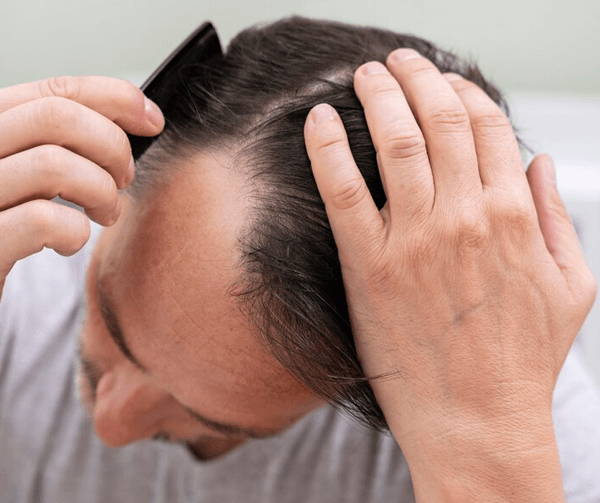In continuation from the previous article, we will look at some of the other factors that can tamper with your body’s thyroid levels, and cause hair loss as well.
- Adrenal fatigue: The adrenal glands are located right on top of the kidney, and our body relies heavily on it during situations of stress and anxiety. In today’s world, stress comes in various manners and almost all of us are constantly hounded by it. However, many of us are unable to recognise and differentiae regular stress from adrenal stress. Simply check yourself for a few symptoms, such as lack of sleep, migraines, depression, sudden weight gain, low libido, frequent urination, dizziness while getting up and if the answer is in the affirmative for most of them, then you might be suffering from adrenal fatigue.
While many people will not associate hypothyroidism with adrenal fatigue, it actually is. If you are constantly tired and are also losing hair, there is quite the chance that both the glands are not working properly. If a saliva test is done, the cortisol levels will be able to provide a clearer indication of whether there are issues with thyroid. If the cortisol levels are constantly low, then there is a high possibility of adrenal fatigue as well as imbalance in thyroid levels as well.
Treating adrenal fatigue will vary from person to person, because individual symptoms will vary. There are numerous over the counter pills that are offered for fatigue, but many of these might not target the precise symptoms of adrenal fatigue. However, certain natural remedies, such as holy basil and ashwgandha might work better. These are also ingredients that will not damage your hair.
- Hair loss induced by drugs: There are several medicines that can lead to hair loss, including birth control pills, drugs that are meant to control cholesterol and high blood pressure, anti-depressants, mood stabilizers and yes, thyroid medications. There are several brands of thyroid medication that are known to bring about hair loss, which is why it is important that you talk to your doctor and ensure that they are prescribing you a medicine that will keep the hair loss to the minimal, if not completely avoid it.
- Imbalances of the sex hormones: When thyroid wreaks havoc on your body, even your sex hormones are affected. Women will notice that when they are struggling with thyroid, they are not only losing their hair, but also having trouble keeping track of their menstrual cycle. Certain studies have shown that hypothyroidism can actually bring the onset of perimenopause, which is the start of menopause. Perimenopause brings with it a completely different set of problems, including rise in the oestrogen levels, which again becomes a cause for hair loss.
The only method to control the rising oestrogen levels is to combat it with progesterone; however the same has to be done in consultation with a doctor. It is at this time, there could be a possible hike in testosterone levels as well, which is why it is crucial that the same be tested. While there is always the presence of testosterone in women too, too high a level or too low a level would cause trouble on the scalp. Hair experts will also talk about DHT or DiHydroxy Testosterone, which is also responsible for hair fall and while testing for thyroid, this too should be checked for.
- Imbalance of blood sugar: Many would think that blood sugar fluctuations and thyroid have nothing in common, but the truth could not be further from this. There is a fluctuation in blood sugar, when you eat too much carbohydrate and there is not enough protein in the body. When the blood sugar runs amok, there is an elevated conversion of T4 into reverse T3. As discussed earlier, reverse T3, which is an inactive hormone, blocks the usage of T3 and this leads to greater hair loss. People suffering from hypothyroidism also tend to be affected by a heightened sensitivity to gluten, and when they continue to consume gluten at a regular rate, they will notice more hair in their combs and towels.
- Alopecia areata: This is technically a hair loss condition, in which bald spots start to appear on the scalp. An autoimmune condition, the immune system of the body starts attacking its own hair follicles, leading to the hair loss. A majority of people who suffer from hypothyroidism also have an autoimmune condition known as Hashimoto’s Thyroiditis, in which the immune system of the body attacks the thyroid gland. When one autoimmune condition becomes prevalent in the body, it opens the body up for other similar conditions too, including alopecia areata. The body becomes susceptible to infections as well as weak to battle toxins and when the body becomes weak, hair and nails are normally the first to get affected.
Now that we have understood a lot about how thyroid and hair loss are associated, it is important to have a checklist of all the dos and don’ts:
- A support group is a good idea at such a time, because you need to realise that you are not the only person going through this situation. While your family and friends might offer you the same, being with others who are going through the same, will prove to be of greater assistance.
- Thyroid is a condition that needs to be cured over a period of time, which is why no magic cures are going to work. You can think about investing in wigs or hair pieces, which will help cover up the major hair loss, but no special oils or lotions will help bring your hair back, in a matter of days.
- This is the time when you will have to really baby your hair – invest in some gentle shampoos and conditioners and combs with wide teeth. Steer clear of chemicals and styling tools that use intense heat.
Normally, hair that is lost to thyroid imbalances returns after a while, which is why all you need to have is a little patience and a commitment to taking your medicines on time and keeping a positive frame of mind.







